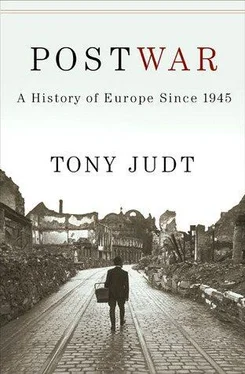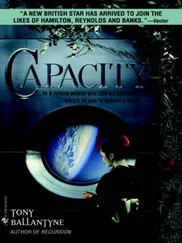As she explained to the Scottish Tory Party Conference, on May 14th 1982: ‘It is exciting to have a real crisis on your hands, when you have spent half your political life dealing with humdrum issues like the environment.’
With perhaps this difference: whereas Margaret Thatcher believed in privatization as something akin to a moral good, Tony Blair just likes rich people.
A 1979 poll revealed that the electoral profile of Mitterrand’s Parti Socialiste uncannily reflected that of the country at large, something no other party could claim.
A former banker and one-time adviser to Gaullist Prime Minister Jacques Chaban-Delmas, Delors would go on to preside over the European Commission from 1985-1995.
Even at the height of popular discontent with government policy, in the economic slump of the mid-1980s, 57 percent of electors declared themselves pleased with Mitterrand’s foreign policy.
In 1982 IRI ( Instituto per la Ricostruzione Industriale ) controlled, among much else, all of Italy’s cast-iron manufacturing, two-thirds of its special steel output, one quarter of its ice-cream production and 18 percent of its peeled tomatoes.
The original goal of the Treuhand was to convert as many as possible of the nine thousand East German companies (employing seven million men and women) into real businesses and liquidate the rest. But under political pressure it preferred to rehabilitate or consolidate many of the unprofitable concerns, ironically thereby creating a new, semi-public sector subsidized from public funds. See Chapter 21.
Instituto per la Ricostruzione Industriale, Instituto Nazionale delle Assicurazioni, Ente Nazionale Idrocarburi, Ente Nazionale per l’Energia Elettrica.
Evgenia Ginzburg, Journey into the Whirlwind (Harcourt, 1967); Margarete Buber-Neumann, Von Potsdam nach Moskau: Stationen eines Irrweges (Stuttgart: Deutsche Verlags-Anstalt, 1957); Wolfgang Leonhard, Child of the Revolution (Pathfinder Press, 1979), first published in Cologne in 1955 as Die Revolution entlässt ihre Kinder ; Victor Serge, Mémoires d’un révolutionnaire (Paris, 1951); Boris Souvarine, Stalin. A Critical Survey of Bolshevism (first published in English in 1939).
Between 1975 and 1981 France alone took in 80,000 refugees from Indo-China.
In 1963, long after he had lost interest in France’s own Communists, the author of Les Mains Sales could still be heard in Prague enthusing about Socialist Realism to a bemused audience of Czech writers and intellectuals.
‘La responsabilité envers l’Histoire dispense de la responsabilité envers les êtres humains’.
‘Pour ma part, je pense que s’il y a une grande cause aujourd’hui, c’est la défense des intellectuals.’ See Le Nouvel Observateur , #1140, septembre 1986, ‘Les Grandes Causes, ça existe encore?’
Antonino Bruno, Marxismo e Idealismo Italiano (1977), pp. 99-100.
Curiously, it was the Czechoslovak government’s decision to ratify the UN human rights Covenants in 1976—the 35th state to do so—that made those Covenants binding under international law.
But even environmentalism had its internal dissidents. Milan Šimečka, the Slovak writer, warned his colleagues (Havel among them) against underestimating the benefits of modernity: ‘I am of the opinion that even the pollution that accompanies industrial prosperity is better than the chaos and brutality which plagues those societies in which people are unable to satisfy their basic needs.’ Milan Šimečka, ‘A World With Utopias or Without Them’, Cross-Currents , 3 (1984), p. 26.
Yugoslavia is the exception that illustrates the rule: ‘As there had never been an official culture established in Yugoslavia (which did not prevent the existence of official figures in cultural life), there could never be its natural opposite, an underground, alternative or parallel culture, such as was richly cherished by other socialist countries.’ Dubravka Ugresic, The Culture of Lies (1998), page 37.
With good reason. As we have since learned, the British and West German peace movements of the time were thoroughly penetrated by Soviet and East German intelligence.
During the 1980s Poland and Czechoslovakia both slipped into negative economic growth—their economies actually shrinking. The economy of the USSR itself had probably been shrinking since 1979.
Timothy Garton Ash, The Uses of Adversity (NY, 1989), page 9.
In agriculture, much of the Soviet Union, Hungary and Romania once again resembled the great nineteenth-century landed estates: poorly-paid, under-performing, inadequately-equipped agricultural labourers did the minimum for their absent employers while saving their energy for the real labour they put into family plots.
I am grateful to Dr Paulina Bren for this reference.
In the Brezhnev years a pound of beef cost three and a half rubles to produce but was sold in shops for two rubles. The European Community subsidized its farmers too, and in approximately the same proportions. The difference, of course, was that Western Europe could afford a Common Agricultural Policy and the Soviet Union could not.
Hungary joined the IMF in May 1982, to mutual self-congratulation. Only in 1989 did it emerge that its government had seriously understated its internal and external debt for the previous decade.
Moreover, like Brezhnev himself, they were among the leading consumers of the age. In a Soviet joke from the time, the Soviet leader is showing his mother his dacha , his cars and his hunting lodges. ‘It’s wonderful, Leonid,’ she says. ‘But what if the Communists come back to power?’
It is of course the business of the Catholic Church to inveigh against material idols and the sin of pride. But Karol Wojtyła went much further. In his 1975 Lenten Exercises at the Vatican, three years before becoming Pope, he explicitly announced that of the two threats to the Church, consumerism and persecution, the former was by far the graver danger and thus the greater enemy.
Witness his initial support for a projected Carmelite convent at Auschwitz, later withdrawn in the face of international protest. His thoughtless description of Poland under martial law as a ‘vast concentration camp’ reflects a similar limitation.
With the encouragement of the Vatican, the US would provide significant financial support for Solidarity in its clandestine years—by some estimates as much as $50 million.
Though early in his presidency, in November 1981, Reagan did let slip the thought that a nuclear war in Europe need not lead to a strategic exchange. Washington’s West European allies were at least as alarmed as Moscow and both protested vociferously.
Читать дальше












